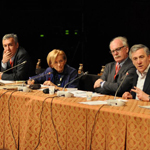Let’s write about the EU
 “Speaking about Europe is a tough task” – admit journalists, who report on the European Union. However if we don’t arouse an interest of the audience, the idea of political integration may collapse
“Speaking about Europe is a tough task” – admit journalists, who report on the European Union. However if we don’t arouse an interest of the audience, the idea of political integration may collapse
“We look at Brussels like it was an alien country. People usually ignore things which happens there and don’t realize how big influence they have on their life. 80 percent of decisions taken in Rome are initiated in Brussels,” said Antonio Tajani, vice-president of the European Commission on the panel “Europe: the insider view” at the Perugia’s International Journalism Festival.
I am a student of political science and a journalist. The majority of my friends are students as well, some have already graduated. They are specialists in many different fields, always ready to have a valuable discussion on current affairs, politics or science. But for our best, we don’t touch the European Union, being aware of the fact, that the conversation may either lead to a confusion, or a quick end. Why? Because we don’t know almost anything about that one of the most important organizations in the world or simply think it’s too boring to be worth our time.
The recent Eurobarometer, survey regularly performed on behalf of the European Commission, mentions that: “at least eight out of ten Europeans have now heard of the European Parliament, the European Commission and the European Central Bank” and estimates that 43 up to 48 percent of Europeans trust them. Unfortunately it doesn’t go farther and didn’t check what do they know about the main European Union’s bodies and the organization itself. This had been shown by another European Commission opinion poll from 2006, according to which fifty two percent of people said the EU has less than 25 and just one out of four Europeans displayed knowledge of the most basic fact of the European Union. I can assume that from this time not a lot has changes. As a proof I will quote one of my Danish friends, a smart, young journalist, who had been recently considering an article about an influence of farther enlargement of the EU on the level of immigration. According to her assumptions, it will bring a new wave of unwanted aliens to Denmark. On the question “Where would they come from?” she answered innocently “For example from Romania”, having no clue that this country is a member of the EU already for four years.
“We have to be accurate when talking about Europe. Recently many newspapers published a story titled ‘Europe don’t do anything on immigration.’ Not Europe, but precisely the European Council doesn’t,” appealed Emma Bonino, vice-president of the Italian Senate, former European Commissioner, on mentioned panel.
Both Emma Bonino and Antonio Tajani agree that Europe should play bigger political role in order to protect all of its citizens. Nevertheless, the idea may easily collapse without the involvement of citizens, due to the fact, that a new treaty has to be ratified by all member states to enter into force. In many countries ratification is preceded by a referendum. Different factors influenced on rejection of the European Constitution in 2005. I don’t want to engage myself in describing the growing nationalism among many member states. This is another, huge and significant topic. I want to mention the rejection of the treaty by Dutch and French, where in conducted referendums the majority of citizens voted against it. It had caused “a domino effect” and led to the decline of the project. Why people rejected the constitution? Because they didn’t understand the complicated document and were constantly cowed by Eurosceptic politicians, according to whom the treaty meant the possibility of losing sovereignty.
This is a task for journalists. We have to write about the EU in order to help people to understand it and don’t let them to be manipulated by politics. “Europe is boring” is just an excuse, because if something is responsible for regulating a significant part of our life, it can’t be entirely boring. It’s not easy, it’s a challenge, but journalists can be equal to the task. However first we ourselves have to understand Europe.
Karolina Drogowska
